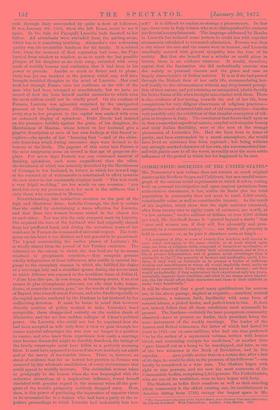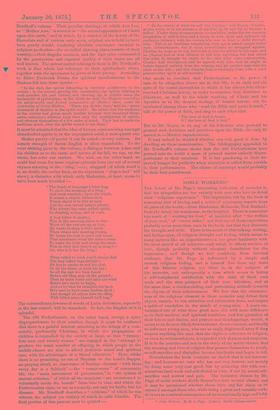COMMUNISTIC SOCIETIES OF THE UNITED STATES.*
MR. NORDHOFF'S new volume does not contain as much original matter as his Northern Oregon and California, but as a careful mono- graph of the curious social experiments to which it refers, resting both on personal investigation and upon copious quotations from authoritative documents, it has, within its limits (for the total population in community does not seem to reach 5,300 souls),
considerable value, as well as considerable interest. As the result of his inquiries, which show that the eight societies examined,
after from twenty-two to eighty years of existence, are worth, at "a low estimate," twelve millions of dollars, or over 2,000 dollars per head, Mr. Nordhoff deems it " proved beyond a doubt " that "men and women can, if they trill, live pleasantly and pros- perously in a communal society,"—i.e., one where all property is
held in common ; or, as he puts it elsewhere more at length :—
"A company of fifty, or even of twenty-five families, well known to each other, belonging to the same church, or at least united upon some one form of religious faith, composed of farmers or mechanics, or both, and strongly desirous to better their circumstances, and to live a life of greater independence and of greater social advantages than is attainable to [by ?] the majority of farmers and mechanics, could, I be- lieve, if they were so fortunate as to possess a leader of sufficient wisdom and unselfishness in whom all would implicitly trust, make an attempt at communistic living with strong hopes of success; and they would undoubtedly, if they maintained their experiment only ten years, materially improve their condition, and what to me seems more import- ant, the life would affect their characters and those of their children in many ways beneficially."
It will be observed that a good -many qualifications for success are, in the above passage, implied as requisite,—numbers, mutual acquaintance, a common faith, familiarity with some form of manual labour, a picked leader, and perfect trust in him. It does not, indeed, follow that all these conditions must necessarily be present. The Icarians—certainly the least prosperous community observed—have at present no leader, their president being the mere instrument of the weekly meetings. The leader of the Aurora and Bethel communes, the latter of which had lasted 30 years in 1874—an ex-man-milliner, who had one time professed " to be the author of a mysterious volume, written with human blood, and containing receipts for medicines," at another time " gave himself out as a being to be worshipped, and later, as one of the two witnesses in the Book of Revelation, and in .this
capacity gave public notice that on a certain day, after a fast of 40 days, he would be slain in the presence of his followers "—can hardly be considered as a wise man. The Shakers began with eight or nine persons, and are now the most numerous of the Communistic bodies, comprising 2,415 persons. The Perfectionists, who are one of the wealthiest, seem to have begun with forty.
The Shakers, as befits their numbers as well as their standing (their community is the oldest existing one, its establishment in America dating from 1794) occupy the largest space in Mr.
• The Communistic Societies of the United States, from Personal Visit and %serration. By Charles Nordhoff. With Illustrations. London: John Murray. 1875.
Nordhoff's volume. Their peculiar theology, in which Ann Lee, or "Mother Ann," is revered as " the second appearance of Christ upon this earth," and in which, by a renewal of the heresy of the Encratists and of various early sects, original sin is held to have been purely sexual, rendering absolute continence essential to religious perfection—the so-called dancing characteristic of their worship,—their singular neatness, and the high price commanded by the genuineness and superior quality of their wares are all well known. The newest matter relating to them in Mr. Nordhoff's work is that which has reference to their spiritualistic views, together with the specimens he gives of their poetry. According to Elder Frederick Evans, the spiritual manifestations to the Shakers fell into three epochs :—
" In the first, the spirits labouring to convince unbelievers in the society ; in the second, proving the community, the spirits relating to each member his past history, and showing up, in certain cases, the insincerity of professions; in the third, he said, the Shakers reacted on the spirit-world, and formed communities of Shakers there, under the instruction of living Shakers. 'There are at this time,' said he, 'many thousands of Shakers in the spirit-world.' He added that the mediums in the society had given much trouble because they imagined them- selves reformers, whereas they were only the mouthpieces of spirits, and oftenest themselves of a low order of mind. They had to teach the mediums much, after the spirits ceased to use them."
It must be admitted that the idea of human missiouarizing amongst disembodied spirits is, to the unprepared mind, a most quaint one.
Shaker poetry—if poetry it can be called—is very curious. Its homely strength of Saxon English is often remarkable. To the most striking piece in the volume, a dialogue between Adam and his children as to the cause and nature of his fall, we can, on the whole, but refer our readers. We wish, on the other hand, we could find room for more copious extracts from one out of several rhymes referring to the " Slug,"—i.e., sluggard (of which word it is, no doubt, the earlier form, as the expression " slug-a-bed" will show), a character with which early Shakerism, at least, seems to have been much troubled :—
"The depth of language I have dug, To show the meaning of a Slug ; And must conclude, upon the whole, It means a stupid, lifeless soul, Whose object is to live at ease, And his own carnal nature please ; Who always has some selfish quirk, In sleeping, eating, and at work.
A lazy fellow it implies, Who in the morning hates to rise; When all the rest are up at four, He wants to sleep a little more.
When others into meeting swarm, He keeps.his nest so good and warm That sometimes when the sisters come To make the beds and sweep the room, Who do they find wrap'd up so snug?— Oh, who is it but Mr. Slug !
When called to work you'll always find The lazy fellow lags behind—
He has to smoke or end his chat, Or tie his shoes, or hunt his hat; So all the rest are busy found Before old Slug gets on the ground ; Then he must stand and take his wind Before he's ready to begin, And ev'ry time he straights his back He's sure to have some useless clack ; And though all others hate the Slug, With folded arms himself he'll hug."
The extraordinary fewness of words of Latin derivation, especially in the last extract, will be remarked. In fact, the English of it is splendid.
The 283 Perfectionists, on the other hand, occupy a space disproportionate to their number, though it must be confessed that there is a painful interest attaching to the doings of a com- munity, professedly Christian, in which the propagation of children is controlled by the society at large, so that " twenty- four men and twenty women " are engaged in the " attempt to produce the usual number of offspring to which people in the middle-classes are able to afford judicious moral and spiritual care, with the advantages of a liberal education." Here, whilst there is no preaching, no use of Baptism or the Lord's Supper, no praying aloud, no observance of Sunday—because "with them every day is a Sabbath" — the " corner-stone " of community life, the "main instrument of government," is "the system of mutual criticism," of which all the members " are accustomed to voluntarily invite the benefit" from time to time, and which the Perfectionists claim to use as a remedy, not only for faults, but for diseases. Mr. Nordhoff describes a " criticism" of which he was witness, the subject (or victim) of which he calls Charles. The final portion of this process must be quoted :—
" ' In the course of what we call stirpiculture: said Noyes, Charles, as you know, is in the situation of one who is, by and by, to become a father. Under these circumstances, ho has fallen under the too common temptation of selfish love, and a desire to wait upon and cultivate an exclusive intimacy with the woman who was to bear a child through him. This is an insidious temptation, very apt to attack people under such circumstances; but it must, nevertheless, be struggled against. Charles, he wont on to say, had come to him for advice in this case, and he (Noyes) had at first refused to tell him anything, but had asked him what he thought he ought to do ; that after some conversation, Charles had determined, and he agreed with him, that ho ought to isolate himself entirely from the woman, and lot another man take his place at her side ; and this Charles had accordingly done, with a most praiseworthy spirit of self-sacrifice."
One needs to recollect that Perfectionism, or the power of man to be altogether above sin in this life, is an early and (in spite of the moral aberrations to which it has always led) often- renewed Christian heresy, in order to conceive that doctrines so abhorrent, as well to the whole teaching of Christ and his Apostles as to the deepest feelings of human nature, can be inculcated among those who "read the Bible and quote it much," talk of the powr of faith, and sing to each other that
"The love of God is better, 0 ! the love of God is best."
But to Mr. Noyes, or to any of his followers who pretend to ground such doctrines and practices upon the Bible, the only fit answer is,—Mentiris impudeutissime.
It may indeed be doubted whether any real good is done by dwelling on these monstrosities. The bibliography appended to Mr. Nordhoff's volume shows that the 283 Perfectionists have poured into the world a mass of printed matter entirely dispro- portionate to their numbers. It is but pandering to their de- praved hunger for publicity when attention is called from outside to their performances. The silence of contempt would probably be their best punishment.



































 Previous page
Previous page